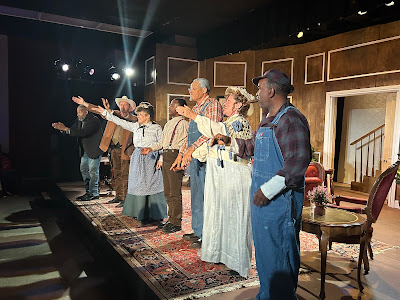 |
| Kymir Cogdell-Freeman as Curtis and Malic Maat as ABCD Credit PPTC |
I find it ironic
that, even before I read Mark Clayton Southers’ statement in his playwright
notes that he was inspired by August Wilson, I sat through “The Bluegrass Mile”
noting how much the play resonated with Wilsonian touches.
Southers emulates
his artistic mentor by planning to write one play focusing on the
African American experience for each decade of the 19th century, just as Wilson
did for each decade of the 20th century. Then, too, Southers has a knack for
telling stories that veer off from the main narrative, similar to what Wilson did
in his plays.
Thirdly, Southers
manages to give his plays much of the same experiential ambience and sense of
place Wilson incorporates into his plays, and both playwrights create strong,
well defined and clearly differentiated characters.
In “The Bluegrass
Mile”, which Southers wrote and is now directing, we get a glimpse at the late
1800s, where African American jockeys were winning their share of important
horse races. According to Michelle Belan, who added explanatory notes to the
program, black jockey, Oliver Lewis, rode Aristedes to victory in the first
Kentucky Derby in 1875.
Between 1890 and
1899, the period in which Southers’ play is set, black jockeys won six Derbies,
one Preakness and three Belmont Stakes. The lucrative nature of the profession
eventually caught the eye of their White counterparts who began sabotaging them
on the track, employing such hostile practices as running them into the rails,
hitting them with their whips and injuring them and their horses.
It is into this
time period that Southers opens his play, now getting its world premiere at the
Madison Arts Center in Pittsburgh’s Hill District. We’re soon introduced to two
young jockeys, ABCD (Malic Maat) and Curtis Henshaw (Kymir Cogdell-Freeman),
who arrive at Rose Lee Drew’s (Crystal Bates) tastefully stylish boarding
house, masterfully created by Pittsburgh scenic designer superstar, Tony
Ferrieri. There to greet them are the mistress of the house who rules her
boarders with a motherly but firm hand and Kermit Thomas (Charles E. Timbers),
a soft-spoken, insightful and sagacious long-time boarder with the physique of
a bull. The playful interplay of wits, jibes and verbal counter foils of Rose
and her boarder provide some of the play’s most entertaining moments.
Both jockeys have
near-opposite temperaments. Maat, as ABCD (pronounced Abee Cee Dee), is older,
more devil-may-care, self-confident, quick with a joke and impish. Note if
you’re wondering about his name, he explains that his father named his children
right out of the alphabet with siblings called EFGH and so on.
Cogdell-Freeman is
a 15-year-old CAPA student, but his young age doesn’t interfere with his
right-on performance. He’s more serious, introspective and inquisitive than his
jockey counterpart, and, as you find out later in the play, he’s also
steadfast, head strong and persistent.
As Curtis, he gets
off the train in town carrying his saddle, something that arouses suspicion in
the townsfolk, who wonder if he’s about to steal a horse to go with it.
 |
| David Whalen, Charles E. Timbers and Cogdell-Freeman Credit: PPTC |
This prompts the
arrival of Sheriff Tanner (David Whalen) bent on investigating the matter with
the cocksure manner of a Southern lawman. Throughout the play, Whalen has to
straddle a fine line between protecting the rights and persons of the jockeys
and quelling the aroused suspicions and anger of the White townsfolk,
especially after an unexpected turn of events after the race is over muddies
the waters and takes the play on an unexpected trajectory.
In Act Two,
Southers masterfully sets up some precarious moments that could lead down a
number of different paths. He draws out the suspense and anxious moments like
some seasoned director of horror films. And there are unexpected plot reversals
that only add to the enjoyment of the play.
In the pivotal
second act, he introduces an auxiliary scene that involves a romantic
tete-a-tete between Rosa Lee and William Pickford (Kevin Brown), a horse
trainer who works for the wealthy Cogsdale family, that could easily be edited
out of the script except it’s so sweetly construed and heart-warming, you’ll be
glad Southers decided to keep it in.
 |
| Crystal Bates as Rosa and Kevin Brown as William Pickford Credit: PPTC |
What happens when
Henrietta Cogsdale’s prized thoroughbred goes missing after the race and the
affected owner (Kendra McLaughlin) enters the boarding house seeking answers
foster some of the most exciting moments of the play. Dressed in the finery of a Southern lady of
wealth by costume designer, Kimberly Brown, McLaughlin captures the patronizing
confidence and bearing of someone at the top of the local social, economic and
power structure.
Just when Rosa Lee
offers to sacrifice it all to help the endangered jockeys, Timbers delivers an
emotional and almost Shakespearean monologue to influence the sheriff and
encourage him to change his course of action. But is it effective enough to
thwart the passions of the frenzied mob outside the house? That question is best left unanswered in
order to let Southers conclude his poignant narrative in his own inimitable style.
If I was asked to
opine whether the play has a chance to go on to other venues around the
country, I’d give it a definite yes. In fact, I liked the totality of the
artistry of the work so much, I even feel it could translate well into a film
adaptation.
In addition to its
sheer entertainment value, the play Southers creates is an important learning
experience, one wrapped cohesively around a well-written story line.
 |
| The Cast of The Bluegrass Mile Credit: PPTC |
The Bluegrass
Mile, written and directed by Mark Clayton Southers, is at the Madison Arts
Center, 3401 Milwaukee Street in Pittsburgh's Hill District thru from October
29. For tickets, go to https://www.pghplaywrights.org.
Comments
Post a Comment